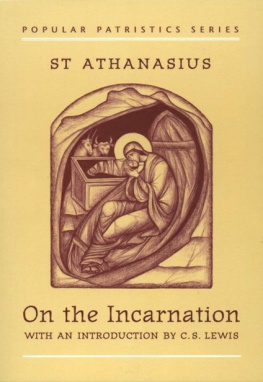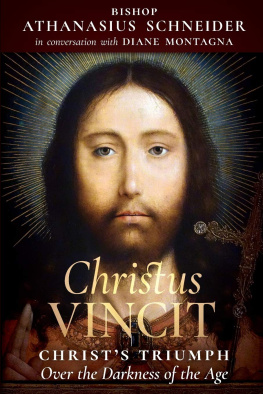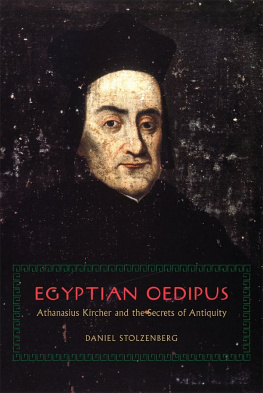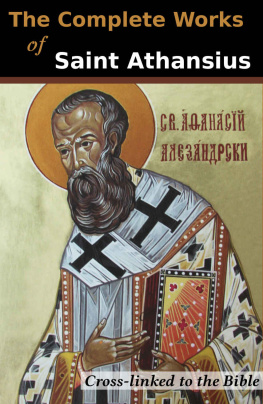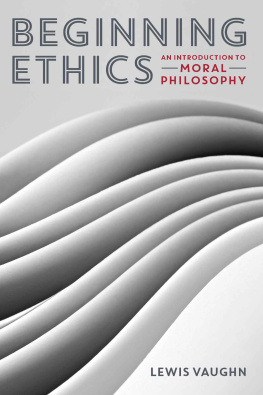St. Athanasius - On the Incarnation, with an Introduction by C. S. Lewis
Here you can read online St. Athanasius - On the Incarnation, with an Introduction by C. S. Lewis full text of the book (entire story) in english for free. Download pdf and epub, get meaning, cover and reviews about this ebook. year: 0, publisher: St Vladimir’s Seminary Press, genre: Religion. Description of the work, (preface) as well as reviews are available. Best literature library LitArk.com created for fans of good reading and offers a wide selection of genres:
Romance novel
Science fiction
Adventure
Detective
Science
History
Home and family
Prose
Art
Politics
Computer
Non-fiction
Religion
Business
Children
Humor
Choose a favorite category and find really read worthwhile books. Enjoy immersion in the world of imagination, feel the emotions of the characters or learn something new for yourself, make an fascinating discovery.
- Book:On the Incarnation, with an Introduction by C. S. Lewis
- Author:
- Publisher:St Vladimir’s Seminary Press
- Genre:
- Year:0
- Rating:3 / 5
- Favourites:Add to favourites
- Your mark:
- 60
- 1
- 2
- 3
- 4
- 5
On the Incarnation, with an Introduction by C. S. Lewis: summary, description and annotation
We offer to read an annotation, description, summary or preface (depends on what the author of the book "On the Incarnation, with an Introduction by C. S. Lewis" wrote himself). If you haven't found the necessary information about the book — write in the comments, we will try to find it.
On the Incarnation, with an Introduction by C. S. Lewis — read online for free the complete book (whole text) full work
Below is the text of the book, divided by pages. System saving the place of the last page read, allows you to conveniently read the book "On the Incarnation, with an Introduction by C. S. Lewis" online for free, without having to search again every time where you left off. Put a bookmark, and you can go to the page where you finished reading at any time.
Font size:
Interval:
Bookmark:

 Athanasius:On theIncarnation
Athanasius:On theIncarnation De Incarnatione Verbi Dei
This translation was made by Sister Penelope Lawson, of the Anglican Community of St. Mary the Virgin in Wantage, England. It was originally published with a byline that reads only "Translated and edited by A Religious of C.S.M.V."
With Introduction by C. S. Lewis
Athanasius stood contra mundum ("against the world") in defense of the biblicaldoctrine of Christ. He opposed Arius when it seemed all the world would follow Arius's heresy. Athanasius's work remains even today one of the definitive statements of orthodox Trinitarianism.


by C. S. Lewis

 here is a strange idea abroad that inevery subject the ancient books should be read only by theprofessionals, and that the amateur should content himself with themodern books. Thus I have found as a tutor in English Literaturethat if the average student wants to find out something aboutPlatonism, the very last thing he thinks of doing is to take atranslation of Plato off the library shelf and read the Symposium.He would rather read some dreary modern book ten times as long, allabout "isms" and influences and only once in twelve pages tellinghim what Plato actually said. The error is rather an amiable one,for it springs from humility. The student is half afraid to meetone of the great philosophers face to face. He feels himselfinadequate and thinks he will not understand him. But if he onlyknew, the great man, just because of his greatness, is much moreintelligible than his modern commentator. The simplest studentwill be able to understand, if not all, yet a very great deal ofwhat Plato said; but hardly anyone can understand some modern bookson Platonism. It has always therefore been one of my mainendeavours as a teacher to persuade the young that firsthandknowledge is not only more worth acquiring than secondhandknowledge, but is usually much easier and more delightful toacquire.
here is a strange idea abroad that inevery subject the ancient books should be read only by theprofessionals, and that the amateur should content himself with themodern books. Thus I have found as a tutor in English Literaturethat if the average student wants to find out something aboutPlatonism, the very last thing he thinks of doing is to take atranslation of Plato off the library shelf and read the Symposium.He would rather read some dreary modern book ten times as long, allabout "isms" and influences and only once in twelve pages tellinghim what Plato actually said. The error is rather an amiable one,for it springs from humility. The student is half afraid to meetone of the great philosophers face to face. He feels himselfinadequate and thinks he will not understand him. But if he onlyknew, the great man, just because of his greatness, is much moreintelligible than his modern commentator. The simplest studentwill be able to understand, if not all, yet a very great deal ofwhat Plato said; but hardly anyone can understand some modern bookson Platonism. It has always therefore been one of my mainendeavours as a teacher to persuade the young that firsthandknowledge is not only more worth acquiring than secondhandknowledge, but is usually much easier and more delightful toacquire. This mistaken preference for the modern books and this shynessof the old ones is nowhere more rampant than in theology. Whereveryou find a little study circle of Christian laity you can be almostcertain that they are studying not St. Luke or St. Paul or St.Augustine or Thomas Aquinas or Hooker or Butler, but M. Berdyaev orM. Maritain or M. Niebuhr or Miss Sayers or even myself.
This mistaken preference for the modern books and this shynessof the old ones is nowhere more rampant than in theology. Whereveryou find a little study circle of Christian laity you can be almostcertain that they are studying not St. Luke or St. Paul or St.Augustine or Thomas Aquinas or Hooker or Butler, but M. Berdyaev orM. Maritain or M. Niebuhr or Miss Sayers or even myself. Now this seems to me topsy-turvy. Naturally, since I myself ama writer, I do not wish the ordinary reader to read no modernbooks. But if he must read only the new or only the old, I wouldadvise him to read the old. And I would give him this adviceprecisely because he is an amateur and therefore much lessprotected than the expert against the dangers of an exclusivecontemporary diet. A new book is still on its trial and theamateur is not in a position to judge it. It has to be testedagainst the great body of Christian thought down the ages, and allits hidden implications (often unsuspected by the author himself)have to be brought to light. Often it cannot be fully understoodwithout the knowledge of a good many other modern books. If youjoin at eleven o'clock a conversation which began at eight you willoften not see the real bearing of what is said. Remarks which seemto you very ordinary will produce laughter or irritation and youwill not see whythe reason, of course, being that the earlierstages of the conversation have given them a special point. In thesame way sentences in a modern book which look quite ordinary maybe directed at some other book; in this way you may be led toaccept what you would have indignantly rejected if you knew itsreal significance. The only safety is to have a standard of plain,central Christianity ("mere Christianity" as Baxter called it)which puts the controversies of the moment in their properperspective. Such a standard can be acquired only from the oldbooks. It is a good rule, after reading a new book, never to allowyourself another new one till you have read an old one in between. If that is too much for you, you should at least read one old oneto every three new ones.
Now this seems to me topsy-turvy. Naturally, since I myself ama writer, I do not wish the ordinary reader to read no modernbooks. But if he must read only the new or only the old, I wouldadvise him to read the old. And I would give him this adviceprecisely because he is an amateur and therefore much lessprotected than the expert against the dangers of an exclusivecontemporary diet. A new book is still on its trial and theamateur is not in a position to judge it. It has to be testedagainst the great body of Christian thought down the ages, and allits hidden implications (often unsuspected by the author himself)have to be brought to light. Often it cannot be fully understoodwithout the knowledge of a good many other modern books. If youjoin at eleven o'clock a conversation which began at eight you willoften not see the real bearing of what is said. Remarks which seemto you very ordinary will produce laughter or irritation and youwill not see whythe reason, of course, being that the earlierstages of the conversation have given them a special point. In thesame way sentences in a modern book which look quite ordinary maybe directed at some other book; in this way you may be led toaccept what you would have indignantly rejected if you knew itsreal significance. The only safety is to have a standard of plain,central Christianity ("mere Christianity" as Baxter called it)which puts the controversies of the moment in their properperspective. Such a standard can be acquired only from the oldbooks. It is a good rule, after reading a new book, never to allowyourself another new one till you have read an old one in between. If that is too much for you, you should at least read one old oneto every three new ones. Every age has its own outlook. It is specially good at seeingcertain truths and specially liable to make certain mistakes. Weall, therefore, need the books that will correct the characteristicmistakes of our own period. And that means the old books. Allcontemporary writers share to some extent the contemporaryoutlookeven those, like myself, who seem most opposed to it. Nothing strikes me more when I read the controversies of past agesthan the fact that both sides were usually assuming withoutquestion a good deal which we should now absolutely deny. Theythought that they were as completely opposed as two sides could be,but in fact they were all the time secretly unitedunited witheach other and against earlier and later agesby a great mass ofcommon assumptions. We may be sure that the characteristicblindness of the twentieth centurythe blindness about whichposterity will ask, "But how could they have thought that?"lieswhere we have never suspected it, and concerns something aboutwhich there is untroubled agreement between Hitler and PresidentRoosevelt or between Mr. H. G. Wells and Karl Barth. None of uscan fully escape this blindness, but we shall certainly increaseit, and weaken our guard against it, if we read only modern books. Where they are true they will give us truths which we half knewalready. Where they are false they will aggravate the error withwhich we are already dangerously ill. The only palliative is tokeep the clean sea breeze of the centuries blowing through ourminds, and this can be done only by reading old books. Not, ofcourse, that there is any magic about the past. People were nocleverer then than they are now; they made as many mistakes as we. But not the same mistakes. They will not flatter us in the errorswe are already committing; and their own errors, being now open andpalpable, will not endanger us. Two heads are better than one, notbecause either is infallible, but because they are unlikely to gowrong in the same direction. To be sure, the books of the futurewould be just as good a corrective as the books of the past, butunfortunately we cannot get at them.
Every age has its own outlook. It is specially good at seeingcertain truths and specially liable to make certain mistakes. Weall, therefore, need the books that will correct the characteristicmistakes of our own period. And that means the old books. Allcontemporary writers share to some extent the contemporaryoutlookeven those, like myself, who seem most opposed to it. Nothing strikes me more when I read the controversies of past agesthan the fact that both sides were usually assuming withoutquestion a good deal which we should now absolutely deny. Theythought that they were as completely opposed as two sides could be,but in fact they were all the time secretly unitedunited witheach other and against earlier and later agesby a great mass ofcommon assumptions. We may be sure that the characteristicblindness of the twentieth centurythe blindness about whichposterity will ask, "But how could they have thought that?"lieswhere we have never suspected it, and concerns something aboutwhich there is untroubled agreement between Hitler and PresidentRoosevelt or between Mr. H. G. Wells and Karl Barth. None of uscan fully escape this blindness, but we shall certainly increaseit, and weaken our guard against it, if we read only modern books. Where they are true they will give us truths which we half knewalready. Where they are false they will aggravate the error withwhich we are already dangerously ill. The only palliative is tokeep the clean sea breeze of the centuries blowing through ourminds, and this can be done only by reading old books. Not, ofcourse, that there is any magic about the past. People were nocleverer then than they are now; they made as many mistakes as we. But not the same mistakes. They will not flatter us in the errorswe are already committing; and their own errors, being now open andpalpable, will not endanger us. Two heads are better than one, notbecause either is infallible, but because they are unlikely to gowrong in the same direction. To be sure, the books of the futurewould be just as good a corrective as the books of the past, butunfortunately we cannot get at them. I myself was first led into reading the Christian classics,almost accidentally, as a result of my English studies. Some, suchas Hooker, Herbert, Traherne, Taylor and Bunyan, I read becausethey are themselves great English writers; others, such asBoethius, St. Augustine, Thomas Aquinas and Dante, because theywere "influences." George Macdonald I had found for myself at theage of sixteen and never wavered in my allegiance, though I triedfor a long time to ignore his Christianity. They are, you willnote, a mixed bag, representative of many Churches, climates andages. And that brings me to yet another reason for reading them. The divisions of Christendom are undeniable and are by some ofthese writers most fiercely expressed. But if any man is temptedto thinkas one might be tempted who read only con-temporariesthat "Christianity" is a word of so many meanings thatit means nothing at all, he can learn beyond all doubt, by steppingout of his own century, that this is not so. Measured against theages "mere Christianity" turns out to be no insipidinterdenominational transparency, but something positive,self-consistent, and inexhaustible. I know it, indeed, to my cost. In the days when I still hated Christianity, I learned torecognise, like some all too familiar smell, that almost unvaryingsomething which met me, now in Puritan Bunyan, now in AnglicanHooker, now in Thomist Dante. It was there (honeyed and floral) inFrancois de Sales; it was there (grave and homely) in Spenser andWalton; it was there (grim but manful) in Pascal and Johnson; thereagain, with a mild, frightening, Paradisial flavour, in Vaughan andBoehme and Traherne. In the urban sobriety of the eighteenthcentury one was not safeLaw and Butler were two lions in thepath. The supposed "Paganism" of the Elizabethans could not keepit out; it lay in wait where a man might have supposed himselfsafest, in the very centre of The Faerie Queene and the Arcadia. It was, of course, varied; and yetafter allso unmistakably thesame; recognisable, not to be evaded, the odour which is death tous until we allow it to become life:
I myself was first led into reading the Christian classics,almost accidentally, as a result of my English studies. Some, suchas Hooker, Herbert, Traherne, Taylor and Bunyan, I read becausethey are themselves great English writers; others, such asBoethius, St. Augustine, Thomas Aquinas and Dante, because theywere "influences." George Macdonald I had found for myself at theage of sixteen and never wavered in my allegiance, though I triedfor a long time to ignore his Christianity. They are, you willnote, a mixed bag, representative of many Churches, climates andages. And that brings me to yet another reason for reading them. The divisions of Christendom are undeniable and are by some ofthese writers most fiercely expressed. But if any man is temptedto thinkas one might be tempted who read only con-temporariesthat "Christianity" is a word of so many meanings thatit means nothing at all, he can learn beyond all doubt, by steppingout of his own century, that this is not so. Measured against theages "mere Christianity" turns out to be no insipidinterdenominational transparency, but something positive,self-consistent, and inexhaustible. I know it, indeed, to my cost. In the days when I still hated Christianity, I learned torecognise, like some all too familiar smell, that almost unvaryingsomething which met me, now in Puritan Bunyan, now in AnglicanHooker, now in Thomist Dante. It was there (honeyed and floral) inFrancois de Sales; it was there (grave and homely) in Spenser andWalton; it was there (grim but manful) in Pascal and Johnson; thereagain, with a mild, frightening, Paradisial flavour, in Vaughan andBoehme and Traherne. In the urban sobriety of the eighteenthcentury one was not safeLaw and Butler were two lions in thepath. The supposed "Paganism" of the Elizabethans could not keepit out; it lay in wait where a man might have supposed himselfsafest, in the very centre of The Faerie Queene and the Arcadia. It was, of course, varied; and yetafter allso unmistakably thesame; recognisable, not to be evaded, the odour which is death tous until we allow it to become life:
Font size:
Interval:
Bookmark:
Similar books «On the Incarnation, with an Introduction by C. S. Lewis»
Look at similar books to On the Incarnation, with an Introduction by C. S. Lewis. We have selected literature similar in name and meaning in the hope of providing readers with more options to find new, interesting, not yet read works.
Discussion, reviews of the book On the Incarnation, with an Introduction by C. S. Lewis and just readers' own opinions. Leave your comments, write what you think about the work, its meaning or the main characters. Specify what exactly you liked and what you didn't like, and why you think so.

